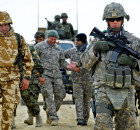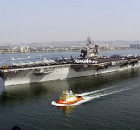
Michael Barone
Though unwelcomed by many liberals, Israeli Prime Minister Benjamin Netanyahu's address received strong bipartisan support, as he compellingly presented the case for stopping Iran from getting nuclear weapons, rather than capitulating to Iran in desperate pursuit of a deal.
Washington Examiner, March 5, 2015
-
Jude Eden
As a female Marine veteran writes, the quest to push women into combat is leading to significantly lowered military standards, with President Obama’s top military officer saying that if a “standard is so high that a woman couldn’t make it, the burden is now on the service to come back and explain, why is it that high?”
Military Review, March-April 2015
-
MacKenzie Eaglen
A 7 percent increase in the military’s civilian workforce under President Obama, combined with an 8 percent decrease in active-duty military personnel, is leaving us with an Army of bureaucrats.
Wall Street Journal, January 29, 2015
-
Newt Gingrich
If the United States wants to win its fight against Islamic terrorism, Congress needs to take a more active role in identifying the enemy and its strongholds, backers, recruitment, and strategic thinking and doctrine—as a precursor to developing strategies for achieving victory.
Wall Street Journal, January 14, 2015
-
![US-submarines-to-go-smoke-free[1]](http://2017project.org/site/wp-content/uploads/2014/09/US-submarines-to-go-smoke-free1-e1412092552473.jpg) Seth Cropsey
Seth Cropsey
The decision to cut the Navy’s attack submarine fleet by 25 percent—“the single-largest strategic consequence of this administration’s defense cuts”—should be reversed.
The Weekly Standard, October 6, 2014
-
William Kristol
Our rash defense cuts may cost us more in the long run, writes a distinguished congressionally appointed panel, as “each service is experiencing degradations in so many areas at once…at a time of growing security challenges”—and “the longer readiness is allowed to deteriorate, the more money will be required to restore it.”
The Weekly Standard, August 11, 2014
-
 Ronald Reagan
Ronald Reagan
In honor of the 70th anniversary of D-Day (June 6, 1944) and the 10th anniversary of Ronald Reagan’s passing (June 5, 2004), here is President Reagan from 30 years ago, speaking movingly at Normandy on June 6, 1984.
The Reagan Foundation
-
 James Jay Carafano
James Jay Carafano
Political leaders merely need to look to history for proof that military strength—not a U.N. treaty—is the best defense of freedom of the seas.
Washington Examiner, April 28, 2014
-
J. Randy Forbes
Will the upcoming Quadrennial Defense Review under President Obama again fail to define the force structure and force-modernization plans needed to execute the full range of missions that our national defense strategy calls for—despite being legally required to do so?
The National Interest, February 24, 2014
-
 James Jay Carafano
James Jay Carafano
With the Obama administration determined to spend money on everything but national defense, we are headed toward a smaller Army, Navy, Air Force, and Marine Corps than we had on September 11, 2001.
The National Interest, February 18, 2014
-
Michael Barone
The sort of shifting alliances, secret negotiations, and sudden policy reversals that have marked the Obama era in world affairs haven’t worked out well in the past.
National Review, December 10, 2013
-
Max Boot
On our current path, we’re headed toward the hollowed-out military of the 1970s.
Commentary, June 25, 2013
-
 Seth Cropsey
Seth Cropsey
America’s underfunded and shrinking Navy, coupled with China’s naval growth, threatens to dangerously alter the balance of power in the Pacific.
The Wall Street Journal, June 20, 2013
-
Seth Cropsey
The consequences of the Navy’s severely reduced budget—cancelled deployments, delayed maintenance, and thinning fleets—are jeopardizing our ability to prepare for threats at sea.
The American Interest, May 21, 2013
-
 Thomas Donnelly
Thomas Donnelly
Admiral Samuel Locklear, head of U.S. Pacific Command, admits that defense cuts are crippling the Navy, leaving it ill-prepared to respond to potential crises.
The Weekly Standard, April 22, 2013

![US-submarines-to-go-smoke-free[1]](http://2017project.org/site/wp-content/uploads/2014/09/US-submarines-to-go-smoke-free1-e1412092552473.jpg)




